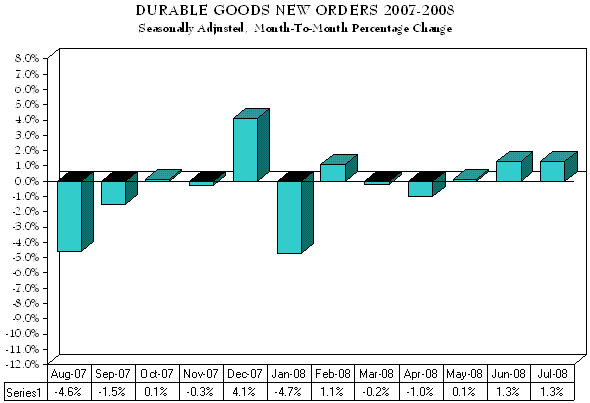Based on the advance report on manufacturers, shipment, inventories and orders – the Commerce Department reported on Wednesday that new orders for long-lasting U.S. manufactured goods, a key indicator of the national manufacturing sector — jumped 1.3% or $2.9 billion to $219.3 billion in July’08.
The consensus had expected a 0.7% decline. This was the third consecutive monthly increase and followed a 1.3% June increase. Excluding transportation, new orders rose 0.7% and are up 3.6% on a y/y basis. If we exclude defense as well, new orders increased 2.8%.
July shipments of manufactured durable goods increased $5.3 billion or 2.5% to $218.3 billion. This followed a 0.9% June increase.
Unfilled orders for July are up twenty-nine of the last thirty months and have increased $6.6 billion or 0.8% to $824.4 billion, up almost up 14% versus last year.
Non-defense capital goods orders excluding aircraft in July increased $4.5 billion or 6.3% to $76.3 billion. Meanwhile, July defense orders decreased $2.9 billion or 25.7% to $8.4 billion.

As we have pointed out in more than one occasion, the claim of the U.S. economy currently in recession — is in direct contradiction with the healthy trend in business investments. The discontinuities in the data simply rejects the validity of the argument. Analysts had expected a 0.5% drop in durables orders excluding transportation. But, even when volatile transportation orders get stripped out, we get a 0.7% demand increase. The shipments component showed a 2.5% advance versus the previous month’s 0.9% increase. Core shipments of capital goods have increased consistently in the last several months, helping in the process sustain productivity growth, thus influencing GDP positively. While I agree the parameters of defining recession are quite different ; the most simplistic one I believe, would be by applying the term recession as an encompassing parameter of the economy in its entirety, rather than just sector-selective. Once this principle is applied, then we are certainly not receding. Look for a Q2’08 upward revision.


Leave a Reply